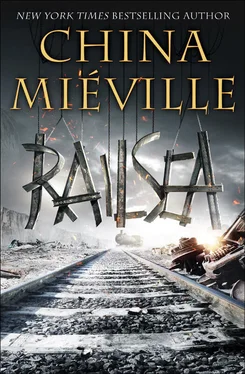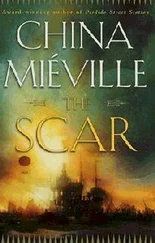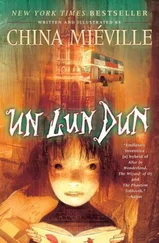“Oh, well. Just that it didn’t … work on me. I really don’t think I want to get on another moletrain.” Sham looked around the house, at all the salvage.
“There are people,” Caldera said, “who say all of us have a Task—they’d say it like that, they wouldn’t say task , they’d say Task —& you’ll know what it is when you hear it. That it’s out there, waiting for you.”
“Maybe,” Sham said thoughtfully.
“I think that’s rubbish myself,” Caldera said. Dero giggled. Sham blinked.
“So none of us have tasks,” Sham said.
“I didn’t say that. Did I say that? I said maybe you don’t have a task. My task right now is to carry stuff.” She lifted various bits of luggage. “No, Dero, your task right now is to stay here & sort through this all. What do you think yours is, Sham?”
Dero tutted & grumbled as Sham followed Caldera, past boxes tied with string & strapped into place, past trunks distended from within like glutted snakes, out into the drossland garden. In sight of the landmark white metal arch, she placed a key in a coffee tin, under a polished tortoise-shell, under a bucket.
“I’m glad it was so important to you to find us & tell us,” Caldera said. “What was it happened to your parents?”
Sham looked up at her. “What?” he said. “Why?” She looked at him until he slumped. Sham pushed after her through the salvagey garden, & muttered a brief version of the story of his father’s disappearance & mother’s grief. “Voam & Troose look after me, though,” he said.
“I believe you,” Caldera said.
“They’re well pleased I got to work on a moler,” he said. “Get to see the world.”
“Some of it,” she said. “I knew what you were going to tell us the moment I opened the door, you know. I mean about our parents. & I hadn’t known until then how much I’d been waiting. I wish someone could’ve found your dad’s wreck. Or where your mum is. Told you. Done that for you, like you done for us.”
She smiled at him. Very quickly & kindly. It was gone almost immediately. Caldera held the ragged weed aside for him. “The world’s fine,” she said. “But you got to wonder what comes after it.”
They were, Sham realised with a start, on the shore. The earth a few yards off became flat & dusty & abruptly less fertile, crammed with intertwined rails. A wooden walkway extended some yards over the rails, at its end a jollycart. Big slabby rock teeth shielded the garden from sight.
“You have a private beach?” Sham said.
Caldera walked onto the jetty. The slats were old, & through their gaps Sham could see paint flakes falling onto earth churned by ferocious little mammals.
“Out there,” she said, “there’s so many things. There are people miles out who roll with the wind, you know, on trains that ain’t changed for centuries. Our parents found their hunt-grounds, & found them. They went with them, learned from them. How to travel without engines. All their stories about the railsea & Heaven & how to get there & the weeping. Everything. Everyone knows something worth learning.”
“Not everyone,” Sham said.
“Alright, not everyone. Most people, though.”
Clouds momentarily parted, & Sham glimpsed the yellow upsky. He heard a plane.
“Do you believe there’s all them riches?” Sham said. “Is that what you’re looking for?”
Caldera shrugged. “I don’t know if I believe it or not. But it ain’t why we’re going.”
“You’re exploring ,” said Sham. “You just want to know.”
She nodded. “We were waiting for them,” she said. “& as much as you could, you brought them back. What else would we do but go where they went? & it ain’t just duty. I promise you that. You showed me a picture. Well, I’ll show you a picture back.”
Caldera took a print from her pocket. Rock weathered into snarls, hillocks supporting scraggy hardland animals, cactus & ivy. Railsea miles. & a staircase.
A staircase. It emerged from the ground, as high as a house, jutting at 45 degrees, ending in the air. A salvage overhang! Sham stared.
“It’s an escalator,” Caldera said. “Way out there.” She pointed to railsea. Below the apex of the stairs’ rise was a cone of dirt & rubbish. What fell from it was not even salvage, but true useless rubbish, rejectamenta beyond reclamation, hauled up out of the innards of the world.
OH MY STONEFACES,” SHAM SAID. “WHERE IS that?”
Caldera glanced back at the house. “Dero’ll be going spare, me leaving him there like that. I just needed a moment.” She looked at Sham. “Just listen. Let me tell you about what’s under there.” She cleared her throat. Caldera told him:
THE STAIRS KEEP GRINDING. They move up, all the time. So when you land on them—& the rails don’t go that close, you have to jump!—you have to race down against the motion so the old escalator powered by who knows what current down there doesn’t deposit you with the garbage—
“How DO YOU KNOW?” Sham said. Caldera blinked.
“They took me once,” she said. “My parents. They were changing their plans. They knew how to use salvage, they just … took me there when they didn’t love doing it anymore. To tell me why. Shhh.”
Caldera continued:
—WITH THE GARBAGE.
So down you run against it carrying your pack, down the metal stairs, into the darkness under the railsea. I know what you’re thinking: that’s where the animals live, & why would you ever do that? But mostly they don’t come into these tunnels & no I don’t know why. So don’t think about burrowing predators, toxic earth, rockfalls, grizzly chthonic deaths.
There are electric lights down there. In the salvage mine.
Don’t think about burrowers. Don’t think about seeing a bulge in that garbage wall, as you walk hunched to get under the beams of the supports, past the trolleys & wagons & discarded tools; don’t think about that bulge roaring into a split into the shadows under the world & onto a snuffling, blind, toothed face.
Just look at this passage. Between layers of pressure-hardened earth & shaley rock, an archaeology of discards, centuries layered. Extruded edges of junk, shards, glass, bits & pieces, faint stretching fronds of ripped-up plastic bags. A greening layer: tiny cogs from a clockwork epoch; crushed plastic; the scintilla from an era of glass; rag-seams of degraded video tape; a gallimaufryan coagulum of mixed-up oddness.
There are places where the pressures of ages & the jostling of continents against each other like slow uncomfortable bedfellows shoves such motherlodes airward, & the railsea is broken by the dangerous jags of salvage reefs, full of trash treasure. & there are these tunnels. Just like there are tunnels where trains can go. You know there are.
What the scholars want to do is work out what these things were . Salvors want to know what they were if & only if it helps sell them. & if it doesn’t, they don’t care. People who want to use them want to know what they were if it means they can be used. Although they’ll work out something to do with them one way or another. They’ll take some reclaimed thing & hit nails with it & call it a hammer if it comes to that.
“WHAT’S WRONG with doing that?” Sham said.
“Wrong?”
THERE’S NOTHING WRONG with that. There isn’t anything right with it either. There’s only one thing that everyone agrees on about salvage. Whether you’re digging it out of the ground or selling it or buying it, or studying it, or bribing someone with it, or wearing it, or looking for it, it catches the eye. Like foil for magpies.
Salvors don’t have to dress like they do. They want to. Those are their peacock feathers. That’s the one thing you can always say for salvage. It looks cool.
Читать дальше












